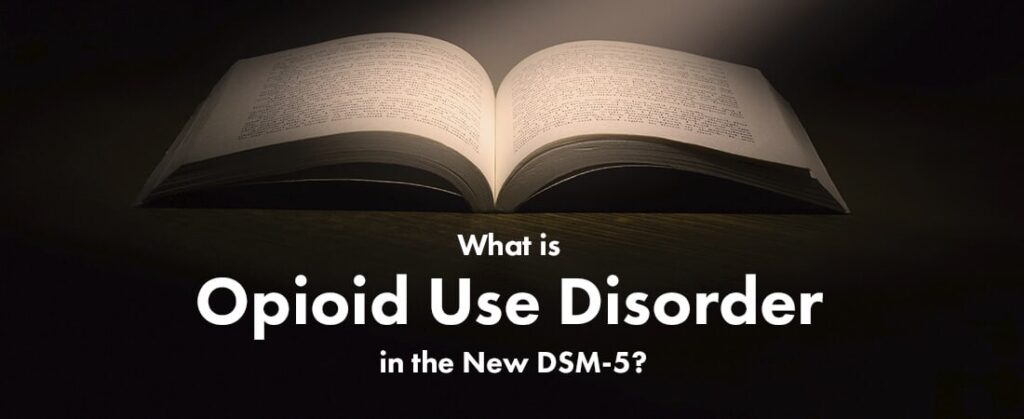What is Opioid Use Disorder in the New DSM-5?
When used properly, prescription opioids can be helpful pain-relief, cough suppression and antidiarrheal medications. The danger, however, is that opioids often give users a powerful high or euphoria their brains can start to crave. Opioid medications carry a high potential for abuse, dependence and addiction.
How do you define those three terms—abuse, dependence and addiction?
- Abuse is when someone is not taking prescription pain medications according to their doctor’s orders, taking more than prescribed or for longer than prescribed.
- Dependence is when the body becomes physically dependent on a chemical to function. When the chemical is taken away, the body’s function is disrupted—producing withdrawal symptoms. People who’ve become dependent but who are not yet addicted are able to stop or taper off their use as directed by their doctor.
- Addiction is when a person continues to use the drug despite harm and consequences. They are unable to stop on their own. They’ve lost power over the medication—it now controls them. People who are addicted are most often also physically dependent and will therefore also experience withdrawal if they stop using.
In recent years, the prevalence of heroin and prescription opioid misuse has significantly increased in the U.S. As a result, there has been an unparalleled rise in the number of people affected with opioid use disorders and opioid-related overdoses and deaths.
If you or someone you love is struggling, don’t wait. Speak confidentially with a counselor right now. Make the call. (888) 837-6577.
What is Opioid Use Disorder?
Opioid Use Disorder is a diagnosis introduced in the fifth edition of the Diagnostic and Statistical Manual of Mental Disorders (DSM-5). DSM-5 combines two disorders from previous editions, Opioid Dependence and Opioid Abuse into this new diagnosis, and includes a broader range of illegal and prescribed drugs in its definition.
There are a variety of opioid drugs, from street drugs such as heroin, to opioids used as a substitute for street drugs, such as methadone, accessed legally through methadone maintenance programs or purchased illegally, to analgesics used mainly in hospital settings, such as morphine, to common painkillers available by prescription, such as codeine and oxycontin.
In other words, an Opioid Use Disorder diagnosis can include a wide range of drugs, accessed through legal and illegal means, and used by people of many different walks of life.

Symptoms of Opioid Use Disorder
According to the DSM-5, the diagnosis of Opioid Use Disorder can be applied to someone who exhibits a problematic pattern of opioid use and has at least two of the following symptoms within a 12-month period:
- Taking more opioid drugs than intended.
- Wanting or trying to control opioid drug use without success.
- Spending a lot of time obtaining, taking, or recovering from the effects of opioid drugs.
- Cravings opioids.
- Failing to carry out important roles at home, work or school because of opioid use.
- Continuing to use opioids, despite use of the drug causing relationship or social problems.
- Giving up or reducing other activities because of opioid use.
- Using opioids even when it is physically unsafe.
- Knowing that opioid use is causing a physical or psychological problem, but continuing to take the drug anyway
- Tolerance for opioids. A need for markedly increased amounts of opioids to achieve intoxication or desired effect.
- Withdrawal symptoms when opioids are not taken.
How serious is the opioid problem?
Even a cursory glance at headlines today will confirm, opioid abuse is nearly epidemic—and it’s a killer.
Opiates can easily be abused (not taken as prescribed) however, and destructive opiate use can lead to a life of addiction, overdose, and death. In fact, a couple years ago for the first time, overdoses on prescription medications outnumbered overdoses on illegal drugs.
–Dr. Karl Benzio, Co-Founder and Chancellor, Honey Lake Clinic and Director of Excellence in Christian Psychiatry, Honey Lake Clinic
It’s important to recognize, abuse, dependence or addiction don’t happen in a vacuum. The path to recovery and wholeness involves getting to the root the problem. We want to help.
To get at underlying hurt and bring lasting healing takes a holistic—spirit, mind and body—approach to addiction diagnosis, management and treatment.
Research continues to show us that spirituality positively influences addiction recovery in many ways. Still, the majority of programs out there refuse to look to God in the healing process.
At Honey Lake Clinic, our experienced doctors and staff strongly believe that faith-based treatment, encompassing spiritual, physical and mental health, will help clients and their families bring spiritual power and clearer psychological understanding to their healing and recovery.
